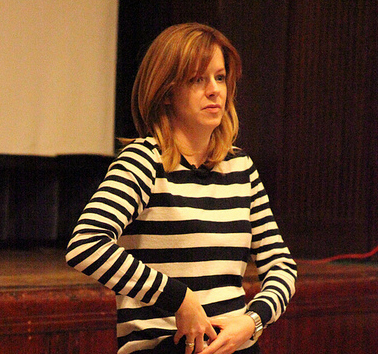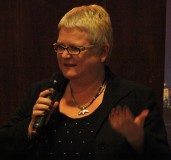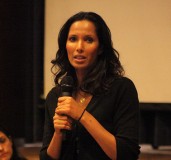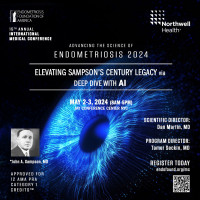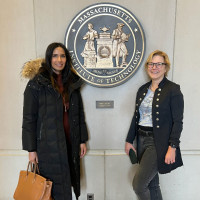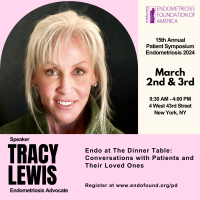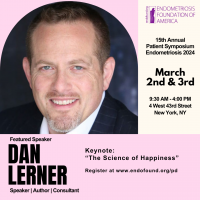Endometriosis Foundation of America
Endometriosis 2013 / My Endometriosis Experience
Lizzie O'Leary
I would take handfuls of Advil to get through the month. But my pain did not follow my cycle in a logical way. It just sort of came and went, didn't really explain anything. I talked to my mum about it and she said, "Well, you know the women in our family tend to have had ovarian cysts. You've probably got cysts, maybe they pop that's what you feel. A lot of pain can make you nauseas. I'm sure that's probably what is going on". The gynecologist said, "Yeah, I think that's probably what's going on". I said, "Okay, all right". And I am not a wallflower. I am a very driven, aggressive woman. I went to college. I went to graduate school. I pursued my dream job in journalism. Every time I moved forward I still just have these moments where I kept getting sick. How many of you have heard the phrase, "You just have a low pain threshold"? Yeah, so I would say probably four or five doctors told me I had a low pain threshold. Several of my family members told me I had a low pain threshold. I had a hard time sometimes coming in to work.
My field is not one where you can, you know, just keep doing your day-to-day job and hope that you are not going to get beaten to a story. I was driving myself every day to try and do the best I could. I remember in 2006 in the mid-term elections standing on the set at Bloomberg and I was having terrible pain and I knew it and I kept thinking, "Okay, something really bad is going on here". I went into the makeup room and I turned to one of the makeup artists and I said, "Who has like anything for pain that's not going to make me say something really stupid on television in the next few hours?" And so again, back to the handfuls of Advil. That year, 2006, I had a diagnostic laparoscopy. Everything was fine. So either they were not looking in the right spot or they did not know what they were looking for.
I kept working, kept feeling really crappy. One of the producers I worked for told me that I was really talented but that I was unreliable. I went home and I cried, and I cried and I cried, thinking, "I've been busting my butt through this financial system collapse every day. I'm camping outside of senators' offices on Capitol Hill trying to get in and sitting there and going like this but I cannot give up because then I will lose this opportunity to do what I have always wanted to do.
Things really started to change for me in 2010. I went down to the Gulf Coast and I covered the BP Oil spill. I lived in Louisiana for four months and I felt pretty sick at the time. This was the biggest story I had ever covered, it was incredible, it was the most exhilarating thing I had ever done. To go out on an oil rig, to fly in helicopters with the Coast Guard and do all this stuff. And I had this terrible pain and I would remember telling my producer at the time, "Listen, if I pass out, just, it's right here. So this is the area that you are going to want them to focus on if we end up like going to a hospital or medical center and I can't really do my thing. I need you to speak for me". But I got through it.
In the summer of 2011 things really went downhill. I tried to pick up my godson who was then an eight-month-old baby and I could not do it. I could not get him off the floor. I went on the recommendation of yet another new doctor who said, "I think you have a hernia. I think maybe you have an inguinal hernia. So then I went to another surgeon and he said, "Nope, appendicitis". I said, "You've got to be kidding me, I'm 35 and we are back to where I was when I was 14 with the appendicitis thing again? I don't have appendicitis". That day I could hardly walk, I was bent over, he said, "We're going to the hospital right now".
I went under for what I thought was going to be a 90 minute appendectomy and I woke up five and a half hours later missing about five inches of my small intestine, my appendix and one endometrioma from my right ovary. But the biggest had been two pretty large endometriomas in my small bowel that had probably been there since I was 14. Dr. Seckin is nodding yes; they have probably been there since you were 14. I have never been more pissed off in my entire life. It was like, "You people! I told you I was in pain. I knew there was something wrong with me. I asked my doctor, ‘Do I have endometriosis'"? "No, you're too young, you don't have the signs. We would have seen it on the diagnostic laparoscopy". You know what I mean. Yes I did, and a lot of it. It was all in there and it had been there for years and building and causing havoc with not just pain but I had bowel endometriosis, so all the really fun stuff that goes along with that.
As soon as I was healthy enough to, and I am looking at you, I froze my eggs. I was single, I was 35 and I froze my eggs and it is the best decision I ever made. The month of sort of going into it, really sucked but I did it. I have never felt more liberated and never felt more liberated as a single, working woman in the dating world thinking, "You know what, I'm not going to go on a date and look at some guy and think, yes, no, maybe, can I...still better than...? Is that going to happen?" No, actually I have the confidence to think I have banked that - that is not my problem. I can do anything else I want to on my own pace. I did that and I got better, a little. I got offered kind of my dream job to be a correspondent at CNN. And I got sick again.
I had another surgery this past summer. I had an excision surgery at GW and I did okay. But, because I have bowel endometriosis, or had bowel endometriosis, I am very sensitive to getting sick. I had a GI infection, which then put me back in the hospital for another four days this fall and it is really only now that I kind of get through a day more like my functional, old self than I am used to. I still have pain. I have had a couple of nerve blocks in my back, those have been quite helpful. And I have the absolute world's greatest godsend in the form of my pelvic floor physical therapist. She is the most wonderful person on the face of the earth and has given me more quality of life back over the past few months that she has been treating me than anyone else.
But this has been a very long journey and the reason I am here today is that when I left CNN people noticed. Hell they noticed that I was not on the air - Washington where I work is a very small, gossipy town and people wanted to know where I went, what - had I got fired? Did I have a drug problem, what was going on and why was I not on the air? I thought about it and I was just not comfortable not saying why I was not on the air. It bothered me that I would somehow have to be ashamed or quiet or not talk about the reason I got sick so often. My very sweet and very supportive, all male, production team knew. They were pretty great. They were unnerved when I would get through a story and run to the bathroom and throw up and then come back and ,"Everything's fine, let's get back on the air, it's great, it's fine".
But I just figured, "Screw it, I'm going to talk about this", so I agreed to do an interview with Cosmo, which is how I connected with you guys and you know it sort of sent my father into like a moment of absolute panic, "Dad, I'm going to be talking about lady parts in Cosmo, sorry. I know you're Catholic and Irish but you'll be fine". It has been such a gift to be able to do that. So many patients tweeted me, I am a very active Twitter presence and the single best one was a pair of parents who said that because of this article we took our 15-year-old daughter to the gynecologist and her cramps, which were so excruciating turned out to be endometriosis. I kept thinking, "Oh my God" that made it all worth it. I do not care if snarky media gossip people are writing nasty things about me I do not care. One teenager went to the doctor - fantastic!
That is my story and I guess I say to the doctors in the room, "Don't ever do this; don't say ‘well, you should just either get pregnant or have a hysterectomy'; which while these may be important options probably do not lead with that. Don't say to someone, "You're not sick". I had a doctor tell me, "You're not sick you just have kind of some stuff going on with your body" and I thought, "Oh, okay, so my endometriosis and my bowel disease, my interstitial cystitis that I had because...I'm not sick. Thank you so much for telling me that". But the best doctors I have had have been warm, open, embracing of a whole host of different things. My neurologist suggested a pain psychologist to talk through about what it was like to be in pain so often. My surgeon sent me to my pelvic floor physical therapist, they talked to one another. They have dinner; there is a whole group at GW that is focused on this. GW also sent me to their integrative medicine center. Acupuncture has been extraordinarily important for me as someone who has taken a lot of Vicodin, getting off opiates for pain control has been extremely important.
And then I have learned because of this to be a better patient. I felt so defeated by endometriosis when I would spend a day in bed basically making out with my heating pad that I felt like such a victim. Feeling like a victim does not help you feel better. Every now and then I still weep on the phone to my best friend but I have been able to say, "Okay there are things that I can do that are going to make me feel better". Going to PT is going to make me feel better, gentle yoga makes me feel better and I am able to swim now, really makes me feel better. The things I can do to eat better, to take fish oils - omega 3s, to do a much more balanced, integrative approach have made me feel like I have some control over what is happening to me. Maybe the idea that you are not sick feels a little more real. It feels like, right you have a long term chronic condition but you are not stuck being in a sick person's body.
And I am looking at you with microphone! Thank you all.
Padma Lakshmi: I would like to thank Lizzie for being here and for being so open and so incredibly articulate with her story. We are going to open it up to questions in just a second but you know I have to tell you for me, when I am screwing up I never talked about it. I never dreamed of standing up in rooms like this and talking about my vagina.
Lizzie O'Leary: I never dreamed of mine being in Cosmo.
Padma Lakshmi: Exactly, so I go to all these events where I see a lot of high powered women and I was sitting there going, "I wonder if she has endo, I wonder if she has endo" trying to recruit other women to open their mouths. I see so many men here who are not doctors but love the women that they are with. I have spoken to some of you, I have met some of you, and I just want to say thank you for being here. Thank you so much for being here and thank you Lizzie, thank you for sharing your story. We hope that you will become a permanent collaborator with us and help us say what many of you already know but what other people need to hear.
One of the reasons I talk about it as a family disease is because I want when not only girls but boys also are learning about their sexuality and learning about their bodies. That this is something they learn about as part and parcel of their whole sex education. You do not hear about it in the emergency room as a last ditch, "Oh maybe its endometriosis", after appendectomy, after bowel problems, after gastro problems. Even if you empower young men, adolescent boys to hear about this maybe they will have a classmate, maybe they will have someone on their debating team or their sister, or their mother and they say, "You know mum I heard about this thing in class and it really affects like one in ten people, maybe you have it. Wouldn't that be amazing?
We applaud Lizzie for being here and sharing her story and we applaud all of you and encourage you as I said before. The other thing that I can encourage, it is not an option financially for everybody we were talking about it this morning. I talked about being 38 or 39 and staring down the barrel of my 40th birthday single and alone and then endometriosis is a very alienating disease. It is a very lonely disease as Lizzie touched on, and as all of you are shaking your heads, you know.
The one thing I can say is if you do have the financial means, I said it on the Today show, someone said, "What would you tell your younger self or other women now that you are 40"? I would say to freeze your eggs. When you are 25 you can freeze your eggs. And if you ever go broke you can always sell them by the way, if you do not use them. I know it sounds weird, it sounds very weird but I am just saying that it is so - no! - you're helping someone else if you feel comfortable with that. We need to talk about these things openly. If you are 25 you can get like 30, 40 eggs like that. Every year that you delay doing that to 30, to 32, to 35, to 39 your chances are diminishing and it is harder. You have to introduce more hormones into the body and all of that. For me, personally, having froze my eggs led to my baby. Not because I used them but because when the doctor that Seckin and I went to see - you have to do all these expensive tests when you do it - I will never forget we got them back and he told me my ovaries were older than I was. When you are almost 40 it is not what you want to hear - that you are even older than you think you are. In my case I stopped using birth control. I tried not to get pregnant all my life and you know. I felt that now I did not need to do that. I was lucky because I had a surgeon who was also interested in protecting my body from the illness that I had. But protecting it in order so that it can do what it naturally needs to do. And to protect my future life and to treat me as a whole human being, with dreams and wishes of family and motherhood if I chose to explore them.
Again, we are not all equal, not everyone wants to have children, not everyone wants a career, not everyone wants a lot of things but we should all have the opportunities to decide. We should have the choice. Taking your health into your own hands and speaking to others about it empowers all of us as a collective whole.
Thank you so much, thank you Lizzie. If you have questions I have the mic and you will get your questions answered.
Audience Member: Hi Lizzie, my name is Vanessa. I have a question that I am at a crossroads, like you I am very determined. I am in college. I was diagnosed with endometriosis in 2009. I had successful surgery and I am actually a patient of Dr. Seckin so I am in good hands. My main thing is like I have chosen not to be a victim but I am having trouble as an up and comer as a professional in my career. How do I handle since I am very vocal, how do I handle having this not being used against me like in the past?
Lizze O'Leary: That is an incredibly important and difficult question professionally and I think one of the biggest things to wrestle with. I can say from my experience I worked with a very, at least the upper echelons of my field, are very male dominated. A lot of the news executives I worked for were men. They did not understand. I wrestled with how much to reveal and how much to keep quiet. I made the decision for me that being vocal was a better route because it seemed to demystify what I was going through. That maybe is not the best decision for everyone, I think it really depends on your circumstances but for me it was very important to not sort of say - sometimes I would hedge it - Wolf Blitzer said, "So what's, why are you out so much"? "I have kind of an inflammatory thing..." What do I say to this guy? I found that it was much more helpful to just say, "I have endometriosis, it's pretty severe, I'm working on it and I'm feeling better, thank you so much". That somehow, I do not know just took away this shame thing. It took away some of the awkwardness that went with it. But yes, some people are really uncomfortable talking about any reproductive health anything. Anything that has to do with women's health and I guess I just decided that screw ‘em and I was going to educate them and they would have to deal with it and that was fine.
Vanessa: Thank you so much for answering.
Audience Member: You are doing you say all sorts of methods to help with this disease. Do you find that diet helps? Is there a certain - because I am on gluten-free, dairy free now and I do not know - I feel like there are so many different arguments on whether you should give up gluten, dairy, whether this is good, that is good, I was wondering what sort of food you eat.
Lizzie O'Leary: In my experience it sort of depends a little bit on the form that your disease has manifested itself in and kind of I would say some of your underlying issues anyway. Since I have had a lot of bowel disease I am very sensitive to my diet. I do not know if any of you guys have read Dian Shepperson Mills book about diet but I found it to be very helpful in terms of explaining a lot of the prostaglandin formation and the things that can exacerbate the pain you feel. There are obviously some things that, I am not a doctor, but because I am a nerdy journalist I read a lot and there clearly seems to be a link in high saturated fat content being not a good thing. I sort have followed a modified anti-inflammatory diet as I have terrible migraines. I do not consume caffeine, which is just...I miss coffee so much. I do not really eat that much sugar anymore, which also sucks, I love chocolate. I would love chocolate croissant would be my idea thing but it is going to make me sick. And it is going to make me miserably sick. I have conducted my own little experiments on myself and if I really want linguini Bolognese or something great like that, I am going to pay for it. I have followed kind of an anti-inflammatory diet and for me it does work.
Lone Hummelshøj: I think actually, unfortunately, we are going to have to probably start cutting the conversation now because we are moving into the next session. We do have a question and answer session at the end so there will be more opportunity to ask questions and just to do the infomercial on Dian's book it is "Endometriosis, a Key to Healing Through Nutrition", and you mentioned migraines which are associated with endometriosis, there is another book by Susan Evans and Deborah Bush called "Endometriosis and Pelvic Pain". They are both very good because they have distinct action points in there and very good explanations.
Lizzie thank you so much for your time.



